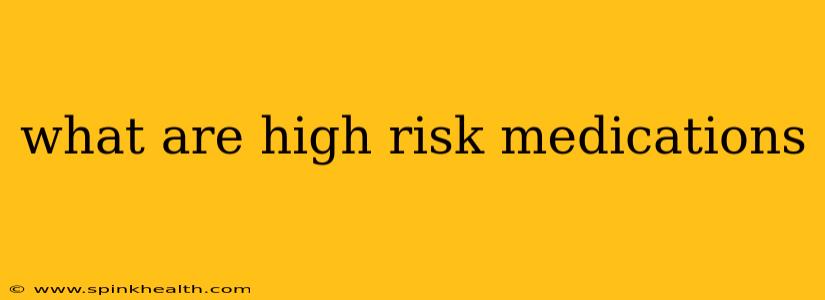What Are High-Risk Medications? Navigating the World of Potential Drug Interactions and Side Effects
The term "high-risk medication" doesn't have a single, universally accepted definition. Instead, it refers to a broad category of drugs that carry a heightened potential for serious adverse effects, significant drug interactions, or require close monitoring due to their narrow therapeutic index (the difference between a therapeutic dose and a toxic dose). Think of it like this: some medications are like carefully calibrated instruments, requiring precise handling, while others are more forgiving. High-risk medications fall firmly into the former category.
Let's delve deeper into what makes a medication "high-risk," exploring various factors and frequently asked questions.
What factors determine if a medication is high-risk?
Several factors contribute to a drug being classified as high-risk. These include:
-
Narrow therapeutic index: Drugs with a narrow therapeutic index require careful monitoring of blood levels to ensure they're effective without causing toxicity. A small increase in dosage can quickly lead to dangerous side effects. Examples include some anticoagulants (blood thinners) like warfarin and certain anticonvulsants.
-
Serious potential side effects: Some medications, even at therapeutic doses, can cause severe or life-threatening side effects. These might include organ damage, heart problems, or severe allergic reactions. Chemotherapy drugs and certain immunosuppressants are prime examples.
-
High risk of drug interactions: Many medications interact negatively with other drugs, supplements, or even certain foods. These interactions can either reduce the effectiveness of the medication or significantly increase the risk of side effects. This is particularly relevant for drugs metabolized by the liver, like many pain relievers and antidepressants.
-
Specific patient populations: Certain medications might be high-risk for specific patient populations, like the elderly, pregnant women, children, or individuals with underlying health conditions. For example, some medications can be particularly harmful to developing fetuses or can negatively affect kidney or liver function in elderly patients.
-
Complex administration: Some medications require specialized administration techniques, increasing the risk of error. For example, intravenous medications require careful monitoring to avoid complications like extravasation (leakage of the drug outside the vein).
What are some examples of high-risk medications?
It's impossible to provide an exhaustive list, as the classification can depend on the individual patient and their circumstances. However, some drug classes frequently associated with high-risk include:
-
Opioids: These potent pain relievers carry a substantial risk of addiction, respiratory depression, and overdose.
-
Anticoagulants: These blood thinners increase the risk of bleeding, requiring careful monitoring and dose adjustments.
-
Chemotherapy drugs: Designed to kill cancer cells, they also affect healthy cells, causing various side effects.
-
Immunosuppressants: Used to prevent organ rejection or treat autoimmune diseases, they increase the risk of infections.
-
Insulin and other hypoglycemics: These medications treat diabetes but can lead to dangerously low blood sugar levels.
How are high-risk medications managed?
Managing high-risk medications effectively often involves:
-
Careful monitoring: Regular blood tests, electrocardiograms (ECGs), or other monitoring techniques may be necessary to track drug levels and detect potential problems early.
-
Dose adjustments: Dosage may need to be carefully adjusted based on individual factors, lab results, and response to treatment.
-
Close collaboration: Close communication between the patient, physician, pharmacist, and other healthcare professionals is crucial.
-
Patient education: Patients need clear and thorough education about their medications, potential side effects, and how to manage them.
What should I do if I'm concerned about a medication?
If you have concerns about a medication you're taking, talk to your doctor or pharmacist immediately. They can assess your individual risk factors, explain potential side effects and interactions, and provide guidance on safe medication use. Don't hesitate to ask questions; informed patients are better equipped to manage their health.
Remember, this information is for general knowledge and shouldn't be considered medical advice. Always consult with a healthcare professional before making any decisions about your medications.

